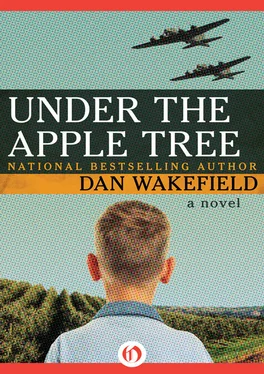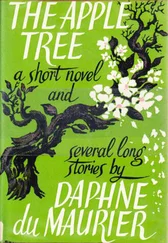No such luck. When Artie went to the Strand one night to slip Shirley a piece of Mom’s angel food cake through the ticket window, he poked his head in the door of the lobby and there was Foltz in his spic and span uniform, standing at rigid Attention by the ticket box like he was some kind of Russian General in his Red Army outfit.
The next afternoon Artie got up his gumption, put on his Boy Scout uniform to make his visit more official, and marched right over to Miss Winger’s Boardinghouse.
Miss Winger wasn’t home, so he went right on up to the room he knew Foltz was living in, and rapped sharply on the door.
Foltz was wearing wrinkled pajamas and a moldy old bathrobe, even though it was late in the afternoon. Artie wondered if he’d been jacking off while he thought about doing pre-verted stuff to Shirley Colby.
“Oh,” said Foltz. “It’s you.”
He didn’t ask Artie to come in but he held the door open so he could.
Artie just nodded and went inside. Foltz started plucking books off the unmade bed so there’d be some place to sit down, but Artie just lowered himself to the floor and folded his legs into Indian pow-wow position.
Foltz shrugged and went over to a hotplate where something was cooking in a pot.
“Want some beans?” he asked.
“No, thank you.”
Foltz picked up the pot, got a fork, and started eating the beans right out of the pot.
“Supper,” he said. “What can I do for you?”
“Well, the best thing you could do, really, would be go somewhere else.”
“You mean leave Town?”
“You hit the nail on the head.”
Foltz ate some beans and then waved the fork toward Artie, like he was leading a band.
“And what will you do if I don’t, officer?”
If Foltz was going to get smart, Artie was going to lay his cards right on the table with no ifs and buts.
“I’m afraid I’ll have to expose you.”
Foltz made his croaking little laugh.
“To who?”
“The United States Marines.”
“For what?”
“Impersonating a veteran of Guadalcanal, and messing around with the girl friend of a Marine who really was there, and who is still out fighting for his country in the South Pacific.”
“That’s your privilege,” Foltz said. “But it you ask me, the Marines have bigger fish to fry these days.”
Foltz sounded as jaunty about it as Jimmy Cagney, and Artie decided to get him where it hurt.
“Too bad you’re not man enough to be out there helping them,” he said.
Then he was sorry.
Foltz started quivering, like he was going to go to pieces right then and there. He put the pot back down on the hotplate, turned, and went to the window. He just stood there, staring out, his back toward Artie.
“I should have known,” he said. “Kids are the worst.”
“Well, you asked for it,” Artie said kind of feebly.
Foltz turned around suddenly and stared at him, the blotches on his face getting redder.
“I didn’t ask for a punctured eardrum I never even knew I had till I went for my goddamn physical,” he said.
“I guess not,” Artie said.
“You think I wouldn’t give my ass to be out there right now with your brother, doing my part? I tried to join the damn Marines. They turned me down. Semper Fidelis! Ha.”
Before Artie could think what to say, Foltz started crying.
Artie didn’t know what to do.
He just sat there, feeling crummy.
The crying started all at once and then, after Foltz had angrily clawed his hands at his face, the crying stopped. He brushed the moldy sleeve of the bathrobe over his eyes and then went back and picked up the pot of beans and started pacing the room and eating as he talked.
“You know what they did at the Draft Board when I asked if there was anything I could do, any kind of operation I could have to fix the damn thing? They laughed. I should get a medal, kid. I have given more laughs to more people in Wartime than Bob Hope with all his jokes. Me, I don’t have to tell jokes. I am a joke.”
He told how his whole hometown had laughed at him. The awful thing was they had laughed at him even before because he wasn’t any good at sports and never went out for the teams and spent his time reading poems and painting pictures of trees and flowers and he wanted more than anything to join the Army and prove to the world once and for all he was a man and instead it was proved that in fact there was something really wrong with him all along; he must have been born being chicken.
“Chickie,” they started calling him.
“Chickie Foltz.”
Girls made fun of him. When he came along, they sang the popular song “They’re Either Too Young or Too Old.” But Foltz wasn’t to young or too old, he was just too damaged to be of any use. That’s what he felt like anyway, and he felt it even more when the girls sang the part real loud about how the best guys had gone to the army, and the poor guys who were left at home were too feeble to get girls to be hot for them. Think what it must feel like! It meant you couldn’t make a girl fall in love with you, much less make out with her. You were nothing, you were lower than a worm.
Foltz ran.
He dumped his books and paints in one suitcase and threw some clothes in another one and hitched out of town, carrying with him not only his damn damaged eardrum but the telltale Selective Service Card that every male (man or not) had to have on him at all times, the Card that bore the stamp of his official stigma: 4-F.
He hitched to Chicago, thinking he could be anonymous and left alone in a big city, that maybe he could even find a girl there who’d believe he’d been wounded on Guadalcanal when he told her the real-life stories he’d learned from reading Guadalcanal Diary , but the hitch was, he didn’t have a uniform, and a twenty-year-old guy in Chicago without a uniform in 1943 might as well have been a leper fresh out of a leper colony. There were guys in uniform everywhere, pairs and bunches and gangs of them, sailors from the Great Lakes Naval Training Center, soldiers and Air Corps guys from camps and bases in Illinois, Iowa, and Michigan, Marines back home on leave from the East and West coasts to see their folks and girl friends, all of them wearing some uniform, seal of approval, safe and confident, clothed in the colors of war and service, surrounded wherever they went by the “V-girls” and “cuddle bunnies” who were ga-ga over any man in military dress, hot lips puckering and parting to please, please take me, I’m yours, for the night, the weekend, the forty-eight-hour pass, please! Even short guys were loved if they had on a uniform; they were thought to be cute and cuddly and extra brave for putting their little bodies on the line, going into battle along with everyone else, regular fellows who cocked their caps at a jaunty angle and walked with a strut and made everyone laugh and cheer when they got a real big luscious blonde on their lap, kicking her legs in hot delight and circling her long thin arms around the game little trooper.
Foltz got a job as a waiter in a fancy restaurant where the dinner was actually stuck on a sort of sword and soaked in oil and you had to set the food on fire before you served it to the customers. He had to wear a costume with silk knickers and knee socks, and he knew people stared at him not because of the outfit but because he was the only young guy wearing one. Poor excuse for a uniform. When he wasn’t at work he stayed in his room reading poems, or went to movies where he sat in the safety of darkness watching the stories of other people’s lives on the screen, but in Chicago there were always lots of servicemen at the movies, soldiers and sailors with their buddies having a good old time, or worse, with girls, holding hands and legs and boobs, necking and breathing in hard, heavy gasps, making it hard to concentrate on the cowboys chasing the Indians or the gangsters blasting the coppers up on the screen. Once at the fancy restaurant a drunken Air Corps Colonel with a girl who looked just like Lana Turner told Foltz he would make a good mascot for the French Foreign Legion in a getup like that and the girl laughed, her wet red lips spreading wide over gleaming white teeth, and after Foltz set their dinner on fire for them he turned around and went to the kitchen and shucked off his clothes and quit, knowing he had to run again.
Читать дальше












